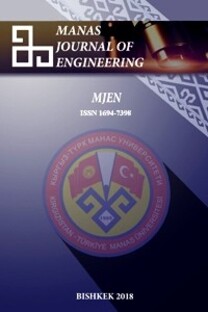Use of Ohmic Heating System in Meat Thawing and Its Effects on Microbiological Quality
This study was conducted to determine the application of the ohmic heating system in meat thawing process and its effects on the microbiological quality of the meats. For this purpose, traditional thawing methods (room temperature and refrigerator) are compared with the ohmic system. Beef loin (Longissimus lumborum, LL) was used as the material in the experiments by cutting into 5x10cm pieces. The samples were divided into three groups by taking the thawing methods into consideration. The grouped meat samples were frozen at -35±1°C for 24 hours and stored at -18°C for 6 months. During the storage period, changes in color (L*,a*,b*) and microbiological condition of the samples were determined periodically throughout the storage period. In all experimental meat samples thawed by different methods, considering the period of frozen storage; There were statistically significant differences in total microorganism, Pseudomonas spp and coliform numbers after the second month (p<0.05). It was also observed that decreases observed in the number of yeast-mould during storage period were not significant (p>0.05). When the thawing methods applied in this study evaluated in terms of L*, a*, b* values, there was no statistically difference between the groups (p> 0.05). As a result, it has been concluded that the ohmic heating system can be used as an alternative method for thawing frozen meat.
Keywords:
Thawing, meat, storage microbiology, ohmic heating,
___
- [1] Liu, L., Llave, Y., Jin, Y., Zheng, D., Fukuoka, M., and Sakai, N. (2017). Electrical conductivity and ohmic thawing of frozen tuna at high frequencies. J of Food Eng. 197:68-77.
- [2] Öztan, A. (2008). Et Bilimi ve Teknolojisi. TMMOB Gıda Mühendisleri Odası Yayınları, Kitaplar Serisi. 6. Baskı. Yayın No:1, Filiz Matbaacılık Sanayi. 182-191. Ankara,
- [3] İçier, F., Izzetoğlu, G.T., Bozkurt, H., Ober, A. (2010). Effects of ohmic thawing on histological and textural properties of beef cuts. J of Food Eng, 99: 360–365. 2010.
- [4] Ünlütürk, A., and Turantaş F. (2003). Gıda Mikrobiyolojisi. Meta Basım Matbaacılık Hizmetleri, 3th ed., 261-276, İzmir, Turkey.
- [5] Cho, H.Y., Yousef, A.E., and Sastry, S.K. (1999). Kinetics of inactivation of Basillus subtilis spores by contionuous or intermittent ohmic and conventional heating. Biotechnology and Bioeng. 62(3): 368-372.
- [6] Sun, H., Kwamura, S., Himoto, J.I., Itoh, K., Wada, T., and Kimura, T. (2008). Effects of ohmic heating on microbial counts and denaturation of proteins in milk. Food Sci. Technol Res. 14(2):117-123.
- [7] Tian, X., Wu,.W, Yu, Q., Hou, M., Gao, F., Li, X., Dai, R. (2017). Bacterial diversity analysis of pork Longissimus lumborum following long term ohmic cooking and water bath cooking by amplicon sequencing of 16S rRNA gene. Meat Sci. 123: 97–104.
- [8] Park, I.K., and Kang, D.H., (2013). Effect of electropermeabilization by ohmic heating for inactivation of Escherichia coli O157:H7, Salmonella enterica Serovar Typhimurium, and Listeria monocytogenes in buffered peptone water and apple Juice. Applied and Environmental Micro, 79(23):7122–7129.
- [9] Aguilar-Machado, D., Morales-Oyervides, L., Contreras-Esquivel, J.C., Aguilar, C., Me´ndez-Zavala, A., Raso, J., and Montan˜ez, J. (2016). Effect of ohmic heating processing conditions on color stability of fungal pigments. Food Sci. Technol. Inter, 1-11.
- [10] Cho, P.P., Yousef, A.E, and Sastry, S.K. (1996). Growth kinetics of Lactobacillus acidophilus under ohmic heating. Biotechnology and Bioeng, 49: 334-340.
- [11] Zell, M., Lyng, J.G., Cronin, D.A, Morgan, D.J. (2010). Ohmic cooking of whole turkey meat- effect of rapid ohmic heating on selected product parameters. Food Chemistry. 120: 724-729.
- [12] Bozkurt, H., and Icier, F. (2012). Ohmic thawing of frozen beef cuts. Journal of Food Process Eng, 35(1):16-36.
- [13] Li, B., and Sun, D.W. (2002). Novel methods for rapid freezing and thawing of foods- a review. J of Food Eng. 54:175-182.
- [14] Rohrle, F.T., Moloney, A.P., Osorio, M.T., Luciano, G., Priolo, A., Caplan, P., and Monahan, F.J. (2011). Carotenoid, colour and reflectance measurements in bovine adipose tissue to discriminate between beef from different feeding systems. Meat Sci. 88(3): 347-353.
- [15] Food and Drug Administration (FDA). (2001). Center for Food Safety and Applied Nutrition Bacteriological Analytical Manuel. USA.
- [16] Food and Drug Administration (FDA). (2002). Center for Food Safety&Aplied Nutrition, Bacteriological Analytical Manual. USA.
- [17] Türk Standartları Enstitüsü (TSE). 1997. Türk Standardı, Et ve et ürünleri-Pseudomonas spp. sayımı, TS ISO 13720. Ankara.
- [18] bioMerieux. (2007). Marcy L’Etoile.VITEK 2 Compact GN Card, Product Number:21341.
- [19] Ferna´ndez, P,P., Sanz, P.D., Molina-Garcı´a, A.D., Otero, L., Guignon, B., and Vaudagna, S.R. (2007). Conventional freezing plus high pressure–low temperature treatment: Physical properties, microbial quality and storage stability of beef meat. Meat Sci. 77: 616–625.
- [20] Boles, J.A., and Swanb, J.E. (2002). Meat and storage effects on processing characteristics of beef roasts. Meat Sci, 62: 121–127.
- [21] Hernández, B., Lizaso, G., Horcada, A., Beriain, M.J., and Purroy, A. (2006). Meat colour of fighting bulls. Arch. Latinoam. Prod. Anim, 14(3): 90-94.
- [22] Apple, J.K., Machete, J.B., Stackhouse, R.J., Johnson, T.M., Cari, A.K., and Yancey J.W.S. (2014). Color stability and tenderness variations within the gluteus medius from beef top sirloin butts. Meat Sci, 96: 56–64.
- [23] Farouk, M.M., and Swan, J,E. (1998). Effect of muscle condition before freezing and simulated chemical changes during frozen storage on the pH and colour of beef. Meat Sci. 50(2): 245-256.
- [24] Liu, Y., Lyon, B.G., Windham, W.R., Realini, C.E., Pringle, D.T.D., and Duckett S. (2003). Prediction of color, texture, and sensory characteristics of beef steaks by visible and near infrared reflectance spectroscopy. A feasibility study. Meat Sci. 65: 1107–1115.
- ISSN: 1694-7398
- Yayın Aralığı: 2
- Başlangıç: 2001
- Yayıncı: KIRGIZİSTAN-TÜRKİYE MANAS ÜNİVERSİTESİ
